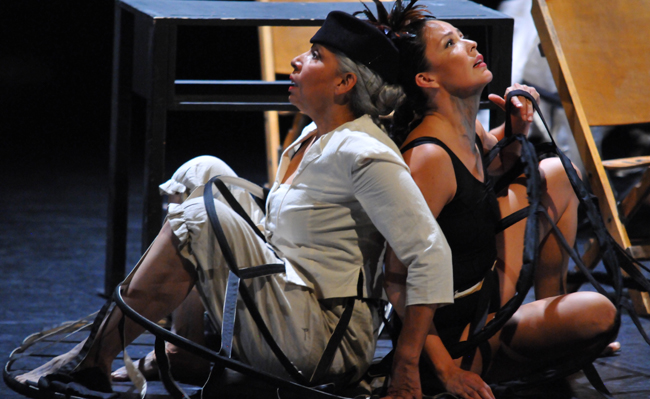Women’s dance world premiere ‘Tipping Colonialism on its Head’

Re-Quickening: International Indigenous Women’s Dance World Premiere “Tipping Colonialism on its Head”
Premieres April 28 Toronto’s Harbourfront, Fleck Centre Theatre
By Laura Robinson
Artistic director Santee Smith, tucks herself into a little Toronto side street where the Pia Bowman Theatre has been home for her and other women dancers and artists as they move into the final week of rehearsals for the world premiere of her latest work, Re-Quickening.
“The title of the performance has two meanings and special connections for us” says Smith, who is Onkwehon:we, a woman of the Mohawk Nation. “It’s about what a woman feels when she feels life in her womb for the first time, and it’s also regarding the address, and words of condolence–words to remove grief from the body at funerals. And ‘re’ also means to come alive.”
Smith’s creation is very much an experience about living, as much for the audience as for the performers. She doesn’t want to call this creation a dance because it goes well beyond dance with spoken words, props and costumes that matter profoundly in what she wants to convey. If there ever was an example of the medium being the message, Re-Quickening is it.
While Smith walks and stands with the smooth alignment of a ballerina, thanks to six years at the National Ballet School in Toronto–and her work reflects that grace, she has spent far more years exploring and creating works about what it means to be an Aboriginal woman. From these traditions—both from Turtle Island and Europe, Smith followed “a trajectory which led me to study indigenous dance form around the world, and I thought about, ‘how do we decolonize the body? How do we understand the murdered and missing women? How do we understand the body?’”
Re-Quickening questions all of this and more as Smith translates what she is asking into movement, props and costume. “Where do we find ourselves as Indigenous women within the historical fractures that everyone has experienced? How do we move forward in our personal healing? What might it have been like prior to contact? How do we express our loss and who we have been made to become in a Euro-centric patriarchal society?”
Smith says she looks to the revitalization of “old teachings” and “old knowledge” in order to for a lot more to be possible. “I’d like to rebuild, reconstruct and reclaim the intact feminine so we could be completely whole as women and have body sovereignty.” It’s here where she challenges colonization and the resulting horrendous treatment of indigenous women. How is it possible to claim sovereignty over your own body when the larger culture continues to see it as disposable? Through dance Smith not only poses these questions but offers hope. Part of that hope is found within the international collection of women who have come together for Re-Quickening: they are a powerful force.
Monique Mojica (Guna, Rappahannock Nations) one of the founders of Native theatre in Canada and Marina Acevedo (Zapotec descent) a dancer from Mexico, who even in rehearsal has at the same time a polished and raw presence, join Smith on stage. Frances Rings (Kokatha Tribe descent), Louise Potiki-Bryant (Kāi Tahu, Kāti Mamoe and Waitaha descent, Māori), Bianca Hyslop (Te Arawa, Ngati Whakaue, Maori), Nancy Wijohn (Te Rarawa, Tuhoe/Ngati Paoa, Ngati Tahu, Māori), Cris Derkson (Cree descent) all contributed to the workshopping of the performance and on the technical aspects of the work. While Re-Quickening looks to the past for inspiration, the actual performance also involves a modern multi-media production with music, screened visuals and sound emanating from the performers in addition to the electronic additions.
Leanne Simpson (Michi Saagiig Nishnaabeg ancestry from Alderville First Nation), Christi Belcourt (Métis), Alva Jamieson (Onkwehon:we), Leigh Smith ((Kenien’keha:ka/Mohawk Nation) and elder Maria Campbell (Métis) also collaborated on this production, which was nearly three years in the making. But as artistic director, choreographer and one of the performers, Smith’s commitment to dance and performance shines through. She was dancing by age two and hasn’t stopped. She founded Kaha:wi Dance Theatre (KWT) in 2005, and has won numerous awards for her creations. Re-Quickening is part of Next Steps at Toronto’s Harbourfront. For more information please visit: http://www.harbourfrontcentre.com/nextsteps/kahawi-dance/


